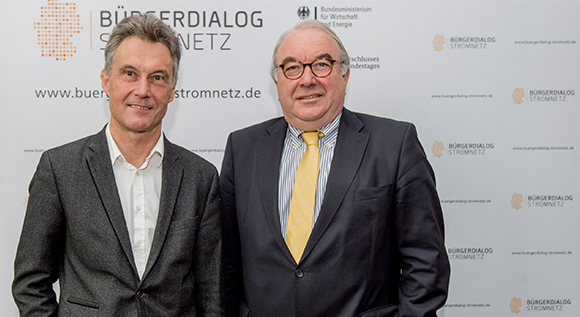Federal Ministry for Economic Affairs and Energy launches public dialogue on the grid
Initiative introduces a new culture of dialogue on the expansion of the electricity grid.
 Uwe Beckmeyer, Parlamentarischer Staatssekretär im Bundesministerium für Wirschaft und Energie (rechts), and Dr. Peter Ahmels, Head of "Bürgerdialog Stromnetz" (left) at the kick-off event. © Christian Kruppa
Uwe Beckmeyer, Parlamentarischer Staatssekretär im Bundesministerium für Wirschaft und Energie (rechts), and Dr. Peter Ahmels, Head of "Bürgerdialog Stromnetz" (left) at the kick-off event. © Christian Kruppa
The Federal Ministry for Economic Affairs and Energy is placing a greater focus on dialogue with the public – promoting an initiative for a public dialogue on the grid. Speaking at the launch of the initiative, which was started on 18 May 2015, Parliamentary State Secretary Uwe Beckmeyer said: "If the Energy Transition is to succeed, it is crucial that we expand the grid. This is why we want to involve members of the public who are affected by specific expansion plans as early as possible. The German government takes the views and concerns of local residents very seriously."
Expansion of the grid – key to the success of the energy transition
Today, more than a quarter of our electricity comes from the sun, wind, and other renewable sources. In 10 years' time, the share of electricity from renewables is to have been raised to 40-45%. In addition to this, Germany wants to phase out nuclear energy entirely by 2022. This also changes the requirements for our energy infrastructure. Unlike electricity generated by conventional power stations, "renewable electricity" is produced locally – using solar panels on house roofs or along motorways, as well as at onshore and offshore wind farms. This energy, generated at many locations right around the country, then needs to be taken to wherever it is needed. In the future, electricity generated from wind power in the north and east of the country is to be transported over long distances to towns and cities in the south. This means that power lines must be modernised and reinforced. Additional transmission lines and transformer stations must also be built wherever they are needed. Expanding the grid is thus the central infrastructure project within the Energy Transition.
State Secretary Beckmeyer made it clear that expanding the grid is the most economic means of transforming our power supply into the future, saying: "Energy storage solutions, such as power-to-gas, are often put forward as an alternative to the expansion of the grid. However, these solutions are not yet sophisticated enough and are still a long way from being economical".
The public wants its say: Public dialogue on the grid offers a platform for discussion
The transmission system operators have recently submitted their first applications for larger electricity highways – a considerable step towards seeing the energy transition actually implemented. The proposed infrastructure corridors provide initial indications of which regions are likely to be affected by the expansion of the grid. The development and construction of new electricity routes and power lines often leads local residents to ask the following questions: Will my direct living environment be affected? How can I become directly involved in the planning process for the expansion of the grid? What is the current status of the project and plans – and what progress has already been made?
The initiative for a public dialogue on the grid has been set up to enable local residents to voice all of their questions regarding the expansion of the grid, and to make their interests and concerns known. The first local events will be taking place in June – where residents can find out how they can get involved in the planning and approval procedures, as well as obtain information on the current status of planning, the technologies involved, and possible alternatives. These events include public conferences, workshops for multipliers, as well as "information markets" which provide the opportunity for local residents to meet together with decision-makers. Each event will focus on the local region, concentrating on places that are especially affected by the expansion of the grid. The initiative was launched with the opening of the public office in the town of Quakenbrück on 22 May 2015. There will also be a mobile public office that will travel to different places across Germany from the end of May onwards. Information on grid expansion projects happening right across Germany can be found at the online public office, where residents can also submit their questions and receive replies. There is a Twitter link (@stromnetzdialog) to information on current developments. In the future, residents will also be able to ask experts specific questions using special chat forums.
The public dialogue on the grid is a neutral platform that is not tied to any particular players. It therefore provides a means for open and transparent discussion. Summing the public dialogue up, State Secretary Beckmeyer said: "This initiative has been set up as a means of assimilating the worries and concerns of local residents and of offering real dialogue between equals. It is designed to help those affected by grid expansion and enable them to feed in their ideas accordingly".

